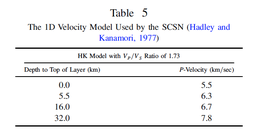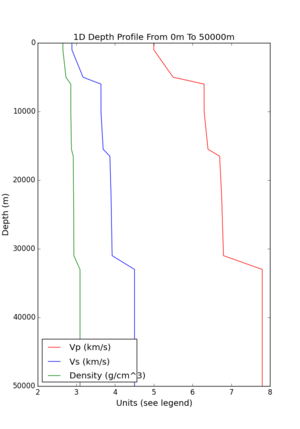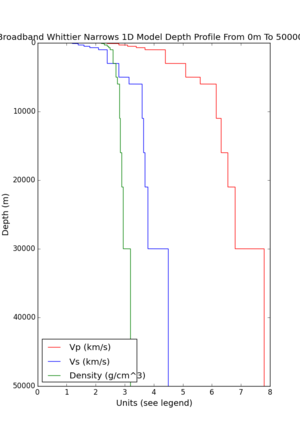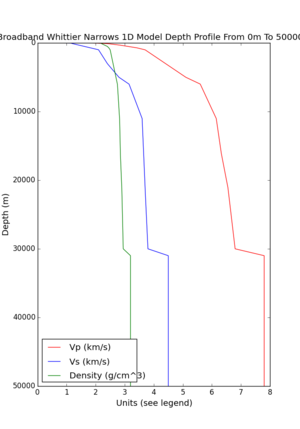Difference between revisions of "Hadley-Kanamori"
| Line 1: | Line 1: | ||
| + | Hadley Kanamori 1D model is used for various purposes in SCEC research, and by seismic networks in California. | ||
| + | |||
| + | == References == | ||
| + | A recent paper that cites the model and defines the layers. | ||
| + | #Hutton, K., Woessner, J., Hauksson, E. (2010) Earthquake Monitoring in Southern California for Seventy-Seven Years (1932-2008) BSSA, Vol. 100, No. 2, pp423-446, April 2010 | ||
| + | |||
| + | == Table == | ||
| + | [[Image:HadleyKanamori-1D.png|256px|thumb|left| Table 5 from Hutton et al 2010]] | ||
| + | |||
== SCSN HK == | == SCSN HK == | ||
| − | + | A text definition of the HK model is given below. SCSN uses a Vp/Vs ratio of 1.73 | |
| − | SCSN | ||
<pre> | <pre> | ||
| Line 12: | Line 20: | ||
== UCVM SCEC 1D Model Definition == | == UCVM SCEC 1D Model Definition == | ||
| + | SCEC uses a modified version of the HK model as a background model in their 3D velocity models. This means that if you query some of the Calfornia CVM's outside their defined coverage region, the CVM will return values from the HK model. In general, CVM tools will use linear interpolate between layers, so material properties returned vary gradually between model layers. | ||
<pre> | <pre> | ||
# 1D Velocity Model configuration | # 1D Velocity Model configuration | ||
| Line 36: | Line 45: | ||
== BBP Northridge/Whittier Narrows Model == | == BBP Northridge/Whittier Narrows Model == | ||
| + | SCEC provides an alternative LA Basin 1D model. This was defined by R. Graves using average Vp, Vs values for a number of sites in the LA Basin region. This model is often used as a 1D model for Los Angeles region ground motion simulations. | ||
| + | |||
<pre> | <pre> | ||
| − | |||
THICKNESS P-VEL S-VEL DENS QP QS | THICKNESS P-VEL S-VEL DENS QP QS | ||
0.0020 1.7000 0.4500 2.0000 45.0000 22.5000 | 0.0020 1.7000 0.4500 2.0000 45.0000 22.5000 | ||
| Line 57: | Line 67: | ||
10.0000 6.8000 3.8000 2.9500 380.0000 190.0000 | 10.0000 6.8000 3.8000 2.9500 380.0000 190.0000 | ||
999.0000 7.8000 4.5000 3.2000 450.0000 225.0000 | 999.0000 7.8000 4.5000 3.2000 450.0000 225.0000 | ||
| − | |||
</pre> | </pre> | ||
| Line 68: | Line 77: | ||
[[File:1d_bbp1d_linear.png|300px]] | [[File:1d_bbp1d_linear.png|300px]] | ||
| − | == | + | == Related Entries == |
| − | + | *[[UCVM]] | |
| − | + | *[CME_Project]] | |
| − | |||
| − | |||
Revision as of 21:28, 22 January 2017
Hadley Kanamori 1D model is used for various purposes in SCEC research, and by seismic networks in California.
Contents
References
A recent paper that cites the model and defines the layers.
- Hutton, K., Woessner, J., Hauksson, E. (2010) Earthquake Monitoring in Southern California for Seventy-Seven Years (1932-2008) BSSA, Vol. 100, No. 2, pp423-446, April 2010
Table
SCSN HK
A text definition of the HK model is given below. SCSN uses a Vp/Vs ratio of 1.73
Top of Layer (km) P-Velocity (km/sec) 0.0 5.5 5.5 6.3 16.0 6.7 32.0 7.8
UCVM SCEC 1D Model Definition
SCEC uses a modified version of the HK model as a background model in their 3D velocity models. This means that if you query some of the Calfornia CVM's outside their defined coverage region, the CVM will return values from the HK model. In general, CVM tools will use linear interpolate between layers, so material properties returned vary gradually between model layers.
# 1D Velocity Model configuration # # Vp is interpolated between layer n to n+1. # Rho is derived from vp (./src/ucvm/ucvm_model_1d.c) # Vs is derived from Vp and Rho (./src/ucvm/ucvm_model_1d.c) # version=Hadley-Kanamori 1D (CVM-S) # Depth of model in layers num_z=9 # Depth to start of layer (km) depth_vals=1.0, 5.0, 6.0, 10.0, 15.5, 16.5, 22.0, 31.0, 33.0 # Vp at start of layer (km/s) vp_vals=5.0, 5.5, 6.3, 6.3, 6.4, 6.7, 6.75, 6.8, 7.8
The model looks as follows:
BBP Northridge/Whittier Narrows Model
SCEC provides an alternative LA Basin 1D model. This was defined by R. Graves using average Vp, Vs values for a number of sites in the LA Basin region. This model is often used as a 1D model for Los Angeles region ground motion simulations.
THICKNESS P-VEL S-VEL DENS QP QS 0.0020 1.7000 0.4500 2.0000 45.0000 22.5000 0.0040 1.8000 0.6500 2.1000 65.0000 32.5000 0.0060 1.8000 0.8500 2.1000 85.0000 42.5000 0.0080 1.9000 0.9500 2.1000 95.0000 47.5000 0.0100 2.0000 1.1500 2.2000 115.0000 57.5000 0.0700 2.4000 1.2000 2.2000 120.0000 60.0000 0.2000 2.8000 1.4000 2.3000 140.0000 70.0000 0.2000 3.1000 1.6000 2.4000 160.0000 80.0000 0.2000 3.4000 1.8000 2.4500 180.0000 90.0000 0.3000 3.7000 2.1000 2.5000 210.0000 105.0000 2.0000 4.4000 2.4000 2.6000 240.0000 120.0000 2.0000 5.1000 2.8000 2.7000 280.0000 140.0000 1.0000 5.6000 3.1500 2.7500 315.0000 157.5000 5.0000 6.1500 3.6000 2.8250 360.0000 180.0000 5.0000 6.3200 3.6500 2.8500 365.0000 182.5000 5.0000 6.5500 3.7000 2.9000 370.0000 185.0000 10.0000 6.8000 3.8000 2.9500 380.0000 190.0000 999.0000 7.8000 4.5000 3.2000 450.0000 225.0000
The non-interpolated (step) version of the model looks as follows:
The interpolated version of the model looks as follows:
Related Entries
- UCVM
- [CME_Project]]



